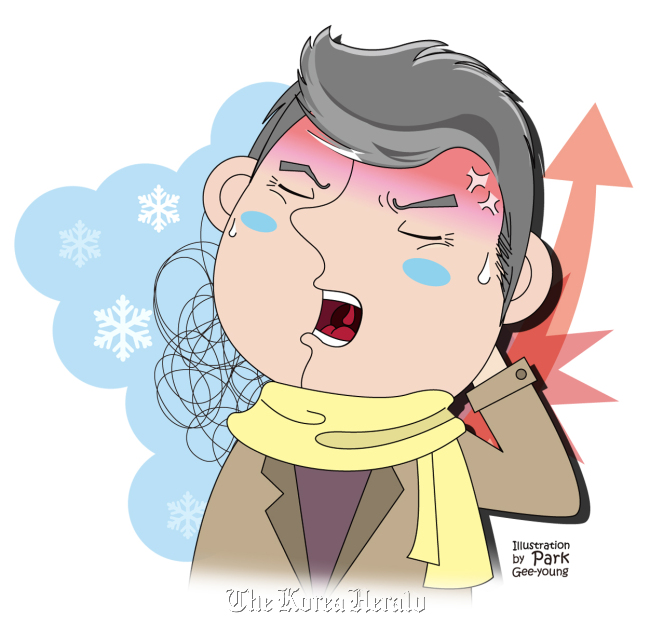Blood pressure tends to drop during the summer and increase again in October when the weather gets colder. When the atmospheric temperature decreases, we produce less sweat and our peripheral vessels constrict, increasing the resistance to blood flow. During the winter, the systolic blood pressure increases by 7mmHg and the diastolic blood pressure increases by 3mmHg on average. This change in blood pressure with different atmospheric temperature is more significant in people with hypertension than in those with normal blood pressure.
When the atmospheric temperature drops, the blood becomes thicker and the lipid (fat) content increases. This promotes constriction of blood vessels, causing an increase in blood pressure and other complications such as atherosclerosis. This is why winter mornings are more dangerous because the blood vessels constrict in the morning causing an increase in blood pressure and the cold weather can worsen the situation, which can lead to heart attacks.

There has been a significant increase in cardiovascular diseases, including angina and myocardial infarction, and cerebrovascular diseases, such as stroke, in middle aged and elderly people in recent years. One of the major causes of this is hypertension, which in present is 20 percent of the Korean population. The prevalence of hypertension increases with age.
Of the different types of hypertension, essential hypertension, which has no identifiable cause, tends to occur after the age of 30. It is present in 40 percent of people aged 60 years and older. Therefore, we must be wary of changes in blood pressure during middle age. However, it can be managed. If your doctor tells you that your blood pressure is high, or that you have hypertension, you should remember these three points and receive appropriate treatment.
(1) High blood pressure should not be ignored and does not resolve itself spontaneously. (2) Hypertension can be successfully managed with appropriate treatment. (3) Treatment of hypertension can prevent cardiovascular diseases such as strokes and heart diseases.
Managing hypertension
● Monitor your blood pressure
Although a mercury sphygmomanometer is the gold standard, most automated blood pressure machines are reasonably accurate except in infrequent cases of malfunction. Because your blood pressure is different each time you measure it, many people believe that these machines are unreliable. However, this is because your blood pressure actually changes constantly. Because your blood pressure fluctuates often, you should not worry about a small increase in blood pressure. You need to calculate an average blood pressure by taking many measurements at different times. You should see your doctor when the average blood pressure is confirmed to be high (above 140/90).
Take care on days when the atmospheric temperature drops abruptly.
Make sure you dress appropriately to keep yourself warm in the cold weather. You should also maintain an appropriate indoor temperature. With every 1 degree Celsius drop in the temperature, the systolic blood pressure and the diastolic blood pressure increases by 1.3mmHg and 0.6mmHg, respectively.
● Watch your weight
When an obese person reduces his or her weight by five kilograms, the systolic and the diastolic blood pressure drops by 10mmHg and 5mmHg respectively, and the effectiveness of antihypertensive medication improves. In the cold winter, decreased physical activity may result in gaining weight, which you sahould bear in mind.
● Decrease intake of salt
Salt causes edema and increases blood pressure. Try to reduce the intake of salt or soy sauce by half.
● Avoid alcohol and smoking
Although smoking does not directly cause hypertension, it is one of the most important risk factors of developing atherosclerosis. Alcohol causes vasoconstriction, causing hypertension.
● Do regular exercise as your doctor recommends
We tend to be less active in the cold season. On warm days, do aerobic exercises such as rapid walking, running, jumping rope, cycling, and aerobics at least 3-4 times a week, for at least 30-45 minutes. Swimming is also good exercise but you should make sure that you dry yourself completely before going outside. When the weather is too cold and it is difficult to do outdoor activities, consider indoor exercise.
● Maintain a positive attitude
Stress can cause an increase in blood pressure. It is important that you sleep enough and avoid overwork by taking time off to relax every day.
● There are strong genetic components in hypertension
When both parents have hypertension, there is an 80 percent risk of the children developing hypertension. When only one parent has hypertension, this risk is about 40-50 percent. Most people experience an increased blood pressure after the age of 30-40 years but some people can develop hypertension quite early. Many people are first diagnosed with hypertension during the winter when the blood pressure tends to increase. Those with a family history should receive a regular check-up.
Take antihypertensive medication (blood pressure tablets) as directed by your doctor.
The winter is a season of hypertension. Nevertheless, once we decide to control it and put it into action, winter will no longer be a season of hypertension.
When the atmospheric temperature drops, the blood becomes thicker and the lipid (fat) content increases. This promotes constriction of blood vessels, causing an increase in blood pressure and other complications such as atherosclerosis. This is why winter mornings are more dangerous because the blood vessels constrict in the morning causing an increase in blood pressure and the cold weather can worsen the situation, which can lead to heart attacks.

There has been a significant increase in cardiovascular diseases, including angina and myocardial infarction, and cerebrovascular diseases, such as stroke, in middle aged and elderly people in recent years. One of the major causes of this is hypertension, which in present is 20 percent of the Korean population. The prevalence of hypertension increases with age.
Of the different types of hypertension, essential hypertension, which has no identifiable cause, tends to occur after the age of 30. It is present in 40 percent of people aged 60 years and older. Therefore, we must be wary of changes in blood pressure during middle age. However, it can be managed. If your doctor tells you that your blood pressure is high, or that you have hypertension, you should remember these three points and receive appropriate treatment.
(1) High blood pressure should not be ignored and does not resolve itself spontaneously. (2) Hypertension can be successfully managed with appropriate treatment. (3) Treatment of hypertension can prevent cardiovascular diseases such as strokes and heart diseases.
Managing hypertension
● Monitor your blood pressure
Although a mercury sphygmomanometer is the gold standard, most automated blood pressure machines are reasonably accurate except in infrequent cases of malfunction. Because your blood pressure is different each time you measure it, many people believe that these machines are unreliable. However, this is because your blood pressure actually changes constantly. Because your blood pressure fluctuates often, you should not worry about a small increase in blood pressure. You need to calculate an average blood pressure by taking many measurements at different times. You should see your doctor when the average blood pressure is confirmed to be high (above 140/90).
Take care on days when the atmospheric temperature drops abruptly.
Make sure you dress appropriately to keep yourself warm in the cold weather. You should also maintain an appropriate indoor temperature. With every 1 degree Celsius drop in the temperature, the systolic blood pressure and the diastolic blood pressure increases by 1.3mmHg and 0.6mmHg, respectively.
● Watch your weight
When an obese person reduces his or her weight by five kilograms, the systolic and the diastolic blood pressure drops by 10mmHg and 5mmHg respectively, and the effectiveness of antihypertensive medication improves. In the cold winter, decreased physical activity may result in gaining weight, which you sahould bear in mind.
● Decrease intake of salt
Salt causes edema and increases blood pressure. Try to reduce the intake of salt or soy sauce by half.
● Avoid alcohol and smoking
Although smoking does not directly cause hypertension, it is one of the most important risk factors of developing atherosclerosis. Alcohol causes vasoconstriction, causing hypertension.
● Do regular exercise as your doctor recommends
We tend to be less active in the cold season. On warm days, do aerobic exercises such as rapid walking, running, jumping rope, cycling, and aerobics at least 3-4 times a week, for at least 30-45 minutes. Swimming is also good exercise but you should make sure that you dry yourself completely before going outside. When the weather is too cold and it is difficult to do outdoor activities, consider indoor exercise.
● Maintain a positive attitude
Stress can cause an increase in blood pressure. It is important that you sleep enough and avoid overwork by taking time off to relax every day.
● There are strong genetic components in hypertension
When both parents have hypertension, there is an 80 percent risk of the children developing hypertension. When only one parent has hypertension, this risk is about 40-50 percent. Most people experience an increased blood pressure after the age of 30-40 years but some people can develop hypertension quite early. Many people are first diagnosed with hypertension during the winter when the blood pressure tends to increase. Those with a family history should receive a regular check-up.
Take antihypertensive medication (blood pressure tablets) as directed by your doctor.
The winter is a season of hypertension. Nevertheless, once we decide to control it and put it into action, winter will no longer be a season of hypertension.

By Sung Ji-dong
The author is a doctor at the Department of Cardiology at Samsung Medical Center and a professor of Sungkyunkwan University School of Medicine. ― Ed.
-
Articles by Korea Herald








![[New faces of Assembly] Architect behind ‘audacious initiative’ believes in denuclearized North Korea](http://res.heraldm.com/phpwas/restmb_idxmake.php?idx=644&simg=/content/image/2024/05/01/20240501050627_0.jpg&u=20240502093000)










